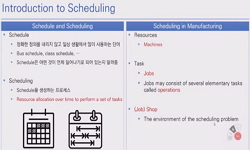In the sender-initiated load balancing algorithms, the sender continues to send an unnecessary request message for load transfer until a receiver is found while the system load is heavy. Meanwhile, in the receiver-initiated load balancing algorithms, ...
http://chineseinput.net/에서 pinyin(병음)방식으로 중국어를 변환할 수 있습니다.
변환된 중국어를 복사하여 사용하시면 됩니다.
- 中文 을 입력하시려면 zhongwen을 입력하시고 space를누르시면됩니다.
- 北京 을 입력하시려면 beijing을 입력하시고 space를 누르시면 됩니다.
https://www.riss.kr/link?id=A76256702
- 저자
- 발행기관
- 학술지명
- 권호사항
-
발행연도
2005
-
작성언어
English
- 주제어
-
KDC
004
-
등재정보
KCI등재
-
자료형태
학술저널
- 발행기관 URL
-
수록면
32-40(9쪽)
- 제공처
-
0
상세조회 -
0
다운로드
부가정보
다국어 초록 (Multilingual Abstract)
In the sender-initiated load balancing algorithms, the sender continues to send an unnecessary request message for load transfer until a receiver is found while the system load is heavy. Meanwhile, in the receiver-initiated load balancing algorithms, the receiver continues to send an unnecessary request message for load acquisition until a sender is found while the system load is light. These unnecessary request messages result in inefficient communications, low CPU utilization, and low system throughput in distributed systems. To solve these problems, in this paper, we propose a genetic algorithm based approach for improved sender-initiated and receiver-initiated load balancing. The proposed algorithm is used for new adaptive load balancing approach. Compared with the conventional sender-initiated and receiver-initiated load balancing algorithms, the proposed algorithm decreases the response time and increases the acceptance rate.
동일학술지(권/호) 다른 논문
-
Classification of Acoustic Signal using Neural Network
- 한국정보기술학회
- Yoonho Kim
- 2005
- KCI등재
-
A Study on Autonomous Driving Mobile Robot by using intelligent Algorithm
- 한국정보기술학회
- Hyojae Kim
- 2005
- KCI등재
-
A Process Status Aggregating service With Failure Detector
- 한국정보기술학회
- Yunhee Kang
- 2005
- KCI등재
-
A Method for Size-Variable Block Matching at Multi-Levels
- 한국정보기술학회
- Seokwoo Jang
- 2005
- KCI등재





 DBpia
DBpia





